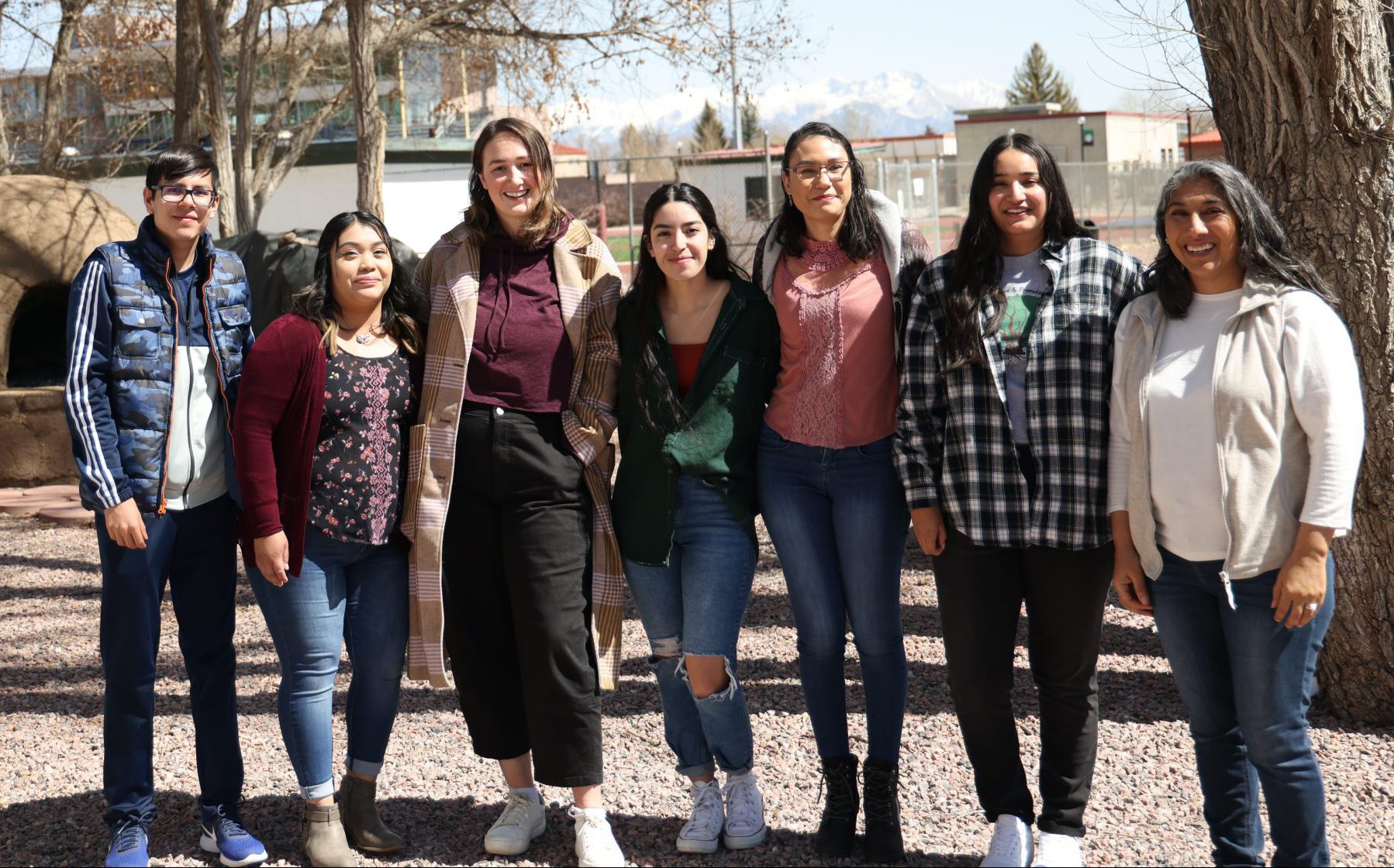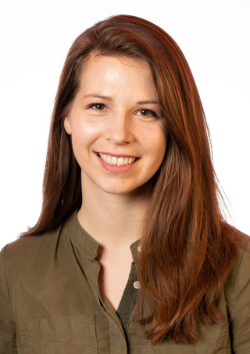
Rural Rising Stars
Across rural America, young leaders are helping respond to their communities’ toughest housing challenges. These rising stars, though early in their careers, are already leaving a lasting impact on the places they call home. More experienced rural housing professionals are laying the foundations of success over the next 50 years, but it is the young professionals of today who will lead their communities to that brighter future.
The Housing Assistance Council (HAC) uses the lessons we have learned over 50 years of service to give a voice to rural communities and to shed light on how the most persistently poor rural areas can share in the nation’s prosperity. Since 1971, HAC has helped build homes and communities across rural America. Through the Vision 2071 campaign, we look toward the next 50 years.
The job of affordable housing professionals is to create the better future in which they want to live. What do young rural leaders envision for their communities?
HOPE Alamosa
“Everyone deserves to live to their full potential.”
 In 2019, the Colorado Trust, a health equity foundation based in Denver, asked the residents of Alamosa, Colorado, to identify their biggest challenge. The town’s answer: young people leaving. Alamosa, which lies in the San Luis Valley just south of the headwaters of the Rio Grande, is aging as young people leave to seek education and job opportunities in larger, urban centers. As Katy Plumb, a young leader who was raised in Alamosa, explains, “I saw myself as one of the main exports of the Valley.”
In 2019, the Colorado Trust, a health equity foundation based in Denver, asked the residents of Alamosa, Colorado, to identify their biggest challenge. The town’s answer: young people leaving. Alamosa, which lies in the San Luis Valley just south of the headwaters of the Rio Grande, is aging as young people leave to seek education and job opportunities in larger, urban centers. As Katy Plumb, a young leader who was raised in Alamosa, explains, “I saw myself as one of the main exports of the Valley.”
So, with the hard work of community organizer Tori Martinez, the Colorado Trust began to recruit a team of 18- to 30-year-olds in Alamosa with the goal of improving the wellbeing of young people there. After just three years together, this team, known as Helping Others and Promoting Equity (HOPE) Alamosa has already conducted community convenings to identify residents’ areas of concern, joined a city council committee, partnered with the San Luis Valley Housing Coalition to support the transformation of an abandoned school into apartments, and much more.
The members of HOPE Alamosa represent a wide swath of the community, and they are motivated by an equally wide range of inspirations. Bryan Flores is from a family of immigrants and joined the team “to be able to give back to the community that gave so much to me.” For others, like Maricella Lucas, the “inequity that the migrant population faces” in Alamosa outrages her into action. As Eliasa Chavez points out in an interview on HOPE Alamosa’s YouTube page, “our group is doing this work…because there’s large portions of our community that haven’t gotten the equality or equity they deserve.” Still, the team members are proud of their community and (as the group’s name implies) hopeful for its future. “What we have in the Valley is special,” says Beatriz Moreno. “I want there to be more opportunities for everyone so they don’t have to move out.”
HOPE Alamosa is building the better future it envisions for their town. Thinking forward to the next half century, the group’s members hope to help Alamosa become more “accepting of all backgrounds and identities,” explains Maricella, with everyone having a healthy home they can afford. As “rents go up,” it becomes harder for young people to stay in Alamosa, she adds, especially in the face of unemployment and stagnant wages. Summing up why the group hopes to leave a legacy of stronger community, Katy puts it simply: “Everyone deserves to live to their full potential.”
Andrea Salas
“People who are at the heart of the issue are at the heart of the solution.”
 Andrea Salas got her start at the California Coalition for Rural Housing’s (CCRH) internship program, a one-year paid internship designed to increase the racial diversity of the next generation of housing and community development leaders. Now, just six years later, she has risen through the ranks to become CCRH’s Director of Technical Assistance and, as of May 2022, Director of Operations.
Andrea Salas got her start at the California Coalition for Rural Housing’s (CCRH) internship program, a one-year paid internship designed to increase the racial diversity of the next generation of housing and community development leaders. Now, just six years later, she has risen through the ranks to become CCRH’s Director of Technical Assistance and, as of May 2022, Director of Operations.
“I got into this field because of my connection with my grandparents,” she says. Her grandfather was a farmworker who first came to the U.S. in 1955 through the Bracero program. After working throughout Texas, Arizona, Nevada, and Idaho, he eventually settled in Sonoma County, California. Hearing stories of her grandparents’ strength and of the inadequate housing they endured, Andrea was left with a provocative question that still drives her work: “How could these people who contributed so much live in such poor conditions?”
Andrea works directly with communities to improve housing conditions, so she sees firsthand how rural areas across California “make the most of” every opportunity, even when they “have nothing.” This resilience speaks to the true power of rural places. As she lays out, “they don’t have capacity, but they do have capability.” Every time people take pride in where they live or their community facilities, that is evidence to Andrea of the town’s strength.
In fifty years, she envisions a future where every community is “thriving” and where everyone has a safe, healthy home. Achieving that will require dedicated, long-term funding, she says. It will also require rural America to overcome additional challenges. Our nation must uplift leaders who reflect their communities. Nonprofits and government should create training opportunities that meet small towns and rural places where they are. The public has to embrace a seismic policy shift towards policy “that puts people first and de-stigmatizes affordable housing.”
This transformational set of changes would not just build more healthy, affordable homes. It would also empower entire communities, inspiring cohorts of young leaders of color, she explains. Andrea recognizes that this ambitious goal may not be achieved in the next half century. Looking back on her work after retirement, she hopes to be able to say that “even if I wasn’t able to achieve that, at least we’re closer.”
Essence Smith
“Where there is outrage, there are solutions.”
 Essence Smith was raised in Chattanooga, Tennessee, but her father’s family is from a small town in Alabama. Every time she would travel to see them, Essence “saw the stark difference between rural and urban America’s” quality of life. Now the Project Manager of Fund Development and Communities at Partners for Rural Transformation, Essence began to try to bridge the gaps between urban and rural communities while in college. An urban planning major, she often found herself asking, “how could I parlay these benefits to rural America?”
Essence Smith was raised in Chattanooga, Tennessee, but her father’s family is from a small town in Alabama. Every time she would travel to see them, Essence “saw the stark difference between rural and urban America’s” quality of life. Now the Project Manager of Fund Development and Communities at Partners for Rural Transformation, Essence began to try to bridge the gaps between urban and rural communities while in college. An urban planning major, she often found herself asking, “how could I parlay these benefits to rural America?”
After five years working, “I found an answer,” she says. “The answer was to rewrite the question,” instead asking, “how can we have innovation in rural America?” Already, Essence is helping rural communities innovate. In addition to helping bring transformational funding to communities, Essence works to uplift the stories of rural Americans.
Rural communities themselves provide her hope. After every hard, dismal event, she notes, there are always people who are outraged. “Where there is outrage, there are solutions,” she says. As a Black woman, Essence is also inspired by the fact that many of the young people leading the charge for their communities “look like me. I am a reflection of rural America.”
Looking forward 50 years, Essence hopes for a rural future that is “socially, financially, and environmentally self-sustainable.” This vision is one where “I don’t have a career,” she adds. It is one in which communities are empowered to advocate for themselves and access the funding they need. It is one where community members are connected to one another and share spaces that provide both community and information. And it is one in which “we ensure we are respecting the sanctity and sovereignty of our land.”
While she hopes she can look back on a career “that was short because the problems were solved,” Essence would also be proud to be able to say that she has “built upon the foundation that was laid for me,” and strengthened rural communities. “I think the lifeblood of this country lies in rural America,” she explains, yet it will take concerted effort to strengthen rural America’s future. Essence is already working to do just that.
Evelyn Immonen
“Why can’t rural communities have the full package?”
 Evelyn Immonen draws inspiration from her grandmother, Annette Davis. A teacher for 50 years, Annette inspired her grandchildren to reconnect to their heritage as descendants of the Turtle Mountain Band of Chippewa. As Evelyn explains, the example of her grandmother’s love and strength motivates her as she helps tribes respond to housing crises or recover from natural disasters. Evelyn is a Program Officer for Rural and Native American Programs at Enterprise Community Partners, where she delivers technical assistance and manages programs for affordable housing organizations across rural America and Indian Country.
Evelyn Immonen draws inspiration from her grandmother, Annette Davis. A teacher for 50 years, Annette inspired her grandchildren to reconnect to their heritage as descendants of the Turtle Mountain Band of Chippewa. As Evelyn explains, the example of her grandmother’s love and strength motivates her as she helps tribes respond to housing crises or recover from natural disasters. Evelyn is a Program Officer for Rural and Native American Programs at Enterprise Community Partners, where she delivers technical assistance and manages programs for affordable housing organizations across rural America and Indian Country.
So far, each step of Evelyn’s career has sharpened her focus on tribal housing and widened her experience building homes. At the Housing Assistance Council, she began to direct her interest in policy into a specialty in rural housing. Her time at HAC also gave her the opportunity to work directly with communities through the Citizens’ Institute on Rural Design. Now, as a board member for NeighborWorks Western Pennsylvania, she is gaining additional angles of experience: insight into housing counseling and financial education.
For Evelyn, her hope for rural communities is invigorated by the “shining stars” she sees in every community. These are the leaders who ask, “so what if I have no resources?” and make their communities better anyway. The future, as she seeks to help shape it, centers around “channels of communication and resources” that direct opportunities to rural communities so that they “can be on the front lines of solving the next housing issue.” She points to groups that are deeply rooted in their communities but have national reach–like HAC or Fahe–as the key to making this vision a reality.
Evelyn, too, is already making a difference, helping to create a future in which all rural communities “have a fighting chance, regardless of resources.” The morning we talked, she had just finished a call with a tribe in California to help them start rebuilding from the Dixie Fire. “Everywhere matters,” she says, and every time someone is left suffering or left out, “that is a failure.” That is why she works in rural housing. By the time she retires, Evelyn aims to have helped more community members to lead their communities forward. “I want the problems facing rural America to end, and I can’t do it alone,” she notes. Evelyn is also focused on a more near-term goal she cannot wait to achieve: visiting a building she helped construct on a reservation.





